Skype Q&A with Filmmaker Josh Fox
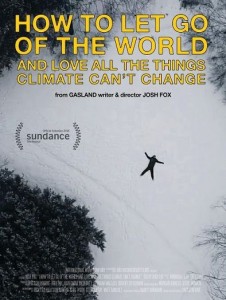 Yesterday evening, the Fort Myers Film Festival screened Josh Fox’s unsettling documentary, How to Let Go of the World and Love All the Things that Climate Can’t Change. The 128 minute film concludes that it is already too late to reverse the damaging effects of hydrocarbons that are causing temperature changes that will result in sea levels rises of thre to seven meters around the globe over the next 20 to 30 years. For the metrically challenged, one meters equals 39 inches. so a sea level rise of 10 to 20 feet planetwide would inundate all of Fort Myers Beach, Pine Island, Matlacha, Sanibel, and downtown Fort Myers. In fact, it could mean that the Florida peninsula from Lake Okeechobee south
Yesterday evening, the Fort Myers Film Festival screened Josh Fox’s unsettling documentary, How to Let Go of the World and Love All the Things that Climate Can’t Change. The 128 minute film concludes that it is already too late to reverse the damaging effects of hydrocarbons that are causing temperature changes that will result in sea levels rises of thre to seven meters around the globe over the next 20 to 30 years. For the metrically challenged, one meters equals 39 inches. so a sea level rise of 10 to 20 feet planetwide would inundate all of Fort Myers Beach, Pine Island, Matlacha, Sanibel, and downtown Fort Myers. In fact, it could mean that the Florida peninsula from Lake Okeechobee south  would disappear beneath the waters of the Atlantic Ocean and the Gulf of Mexico.
would disappear beneath the waters of the Atlantic Ocean and the Gulf of Mexico.
“Fort Myers is one of the most endangered populations in the world and yet I don’t know that it is the hub of climate activism,” filmmaker Josh Fox told a hushed crowd from a moving vehicle that was transporting him home from a Bernie Sanders rally. Fox joined the SRO Fort Myers Film Festival audience via Skype in “the first-ever Q&A from the New York State Throughway.” (That’s just the way that Eric Radditz and his crack FMff team roll.)
“When we were in Miami, I was shocked to find that developers are building 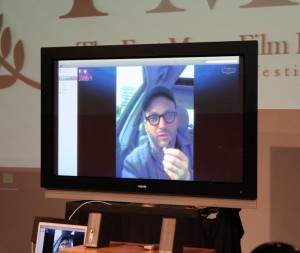 on Miami Beach,” Fox expounded. “Miami Beach is flooding at high tide, and yet the developers are still building. There’s no scenario in which South Florida remains above water.”
on Miami Beach,” Fox expounded. “Miami Beach is flooding at high tide, and yet the developers are still building. There’s no scenario in which South Florida remains above water.”
But Southwest Florida residents and visitors need look no farther than Fort Myers Beach for an example of what Fox calls “head-in-the-sand mentality” when it comes to government officials, urban planners and developers. The City of Fort  Myers Beach is poised to approve a massive beachfront development plan that will add four hotels (a five-story, 200-unit Holiday Inn aimed at families, a six-story, 100-unit AC Marriott targeting younger vacationers, and a seven-story, 176-unit Hilton that contains within it an 86-unit Hampton Inn), an esplanade of retail shops and restaurants, and a parking garage to an already crowded Estero Island. No one who attended last
Myers Beach is poised to approve a massive beachfront development plan that will add four hotels (a five-story, 200-unit Holiday Inn aimed at families, a six-story, 100-unit AC Marriott targeting younger vacationers, and a seven-story, 176-unit Hilton that contains within it an 86-unit Hampton Inn), an esplanade of retail shops and restaurants, and a parking garage to an already crowded Estero Island. No one who attended last  February’s workshop with Torgerson Properties’ CEO Tom Torgerson and co-developer John Dammermann raised concerns about the propriety of the project in the face of sea level rise and superstorms. Fort Myers Beach merchants and residents focused instead on building heights, densities, traffic flow and parking. Although the development plan does include a seawall, that coastal protection measure is designed merely
February’s workshop with Torgerson Properties’ CEO Tom Torgerson and co-developer John Dammermann raised concerns about the propriety of the project in the face of sea level rise and superstorms. Fort Myers Beach merchants and residents focused instead on building heights, densities, traffic flow and parking. Although the development plan does include a seawall, that coastal protection measure is designed merely  to enable the developers and local business owners to lower flood insurance premiums and build at ground level instead of on raised moorings. “It better improve the traffic status quo, or I’m not interested in it,” County Commissioner Frank Mann said in a comment emblematic of the official response to the developers’ proposals.
to enable the developers and local business owners to lower flood insurance premiums and build at ground level instead of on raised moorings. “It better improve the traffic status quo, or I’m not interested in it,” County Commissioner Frank Mann said in a comment emblematic of the official response to the developers’ proposals.
If Fox is right, the first two stories of Grand 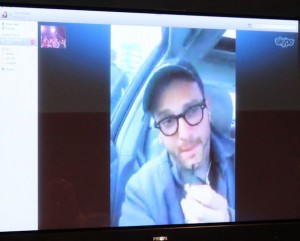 Resorts – Fort Myers Beach will be under water within 20 years. But that’s a minor matter compared to what will happen as nuclear power plants and frack-gas pipelines and substations are inundated by rising sea levels.
Resorts – Fort Myers Beach will be under water within 20 years. But that’s a minor matter compared to what will happen as nuclear power plants and frack-gas pipelines and substations are inundated by rising sea levels.
“I was shocked to find out that they were thinking about expanding the nuclear power plant at Turkey Point. Coastlines will change during our lifetimes. It’s inappropriate to expand nuclear power plants. It’s time to move  nuclear power plants. But nuclear powers take up to 30 years to decommission. We don’t have 20 or 30 years along the coastline in the State of Florida.”
nuclear power plants. But nuclear powers take up to 30 years to decommission. We don’t have 20 or 30 years along the coastline in the State of Florida.”
Fox also expressed concerns about the 516-mile-long Sabal Trail pipeline that was recently approved by the Federal Energy Regulatory Commission. Running from Alabama, through Georgia and into Florida, it is a joint venture  between Florida Power & Light, Duke Energy and Spectra Energy. Although the U.S. Army Corps of Engineers still has to approve the project’s construction through wetlands, work is expected to start later this year with completion in 2017. If sea levels rise ten to twenty feet in the next 20 years, much of the Florida pipeline and many of the planned substations will be flooded.
between Florida Power & Light, Duke Energy and Spectra Energy. Although the U.S. Army Corps of Engineers still has to approve the project’s construction through wetlands, work is expected to start later this year with completion in 2017. If sea levels rise ten to twenty feet in the next 20 years, much of the Florida pipeline and many of the planned substations will be flooded.
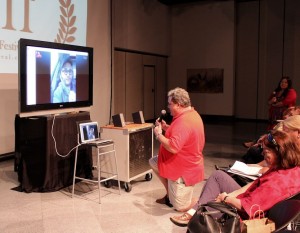 John from Fort Myers Beach asked Fox for a 1-2-3 of what we can do as individuals in the face of such a dire emergency. Fox flatly rejected the efficacy of that type of approach.
John from Fort Myers Beach asked Fox for a 1-2-3 of what we can do as individuals in the face of such a dire emergency. Fox flatly rejected the efficacy of that type of approach.
“As Americans, we are prone to ask what we can do as individuals,” said Fox with a woeful shake of his head. “In truth, the answer is very, very little. As an individual, you can do very, very little. It has to 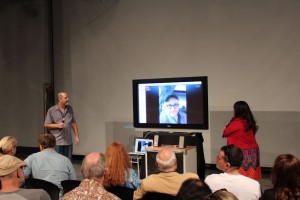 be groups of people acting together. Occupy Sandy had 25,000 volunteers. What we have to do is start thinking about how we’re going to create that sort of collective action, collective organization in Florida.”
be groups of people acting together. Occupy Sandy had 25,000 volunteers. What we have to do is start thinking about how we’re going to create that sort of collective action, collective organization in Florida.”
In Fox’s experience, it all starts with a recognition of the severity of the problem.
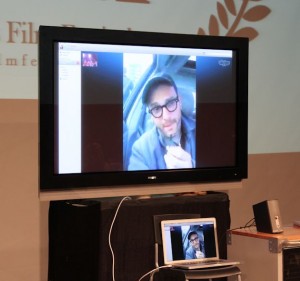 “We have to declare a state of emergency. We have to start working together in a way that’s appropriate to the crisis. The people of South Florida need to band together and speak with a very loud, unified voice, ‘We stand to lose everything. We stand to lose our entire city. We stand to lose our entire peninsula.’ And we do that in defiance of denialists.” And, in defiance of the Scott Administration, which not only refuses to acknowledge the threat Florida faces, but won’t even speak about the subject of climate change.
“We have to declare a state of emergency. We have to start working together in a way that’s appropriate to the crisis. The people of South Florida need to band together and speak with a very loud, unified voice, ‘We stand to lose everything. We stand to lose our entire city. We stand to lose our entire peninsula.’ And we do that in defiance of denialists.” And, in defiance of the Scott Administration, which not only refuses to acknowledge the threat Florida faces, but won’t even speak about the subject of climate change.
 “My hope for the film is that it changes a lot of hearts and minds about how we work on climate change. What’s very important about the film is that it addresses people who really, really care about climate change but won’t organize to do something constructive. It’s not necessarily about the science, but how we connect with our
“My hope for the film is that it changes a lot of hearts and minds about how we work on climate change. What’s very important about the film is that it addresses people who really, really care about climate change but won’t organize to do something constructive. It’s not necessarily about the science, but how we connect with our 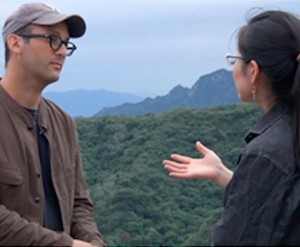 neighbors and how we interact with people who are closed to us. We’re in a state of emergency in South Florida. It has to be acknowledged and it has to be addressed. If not, you will head into the crisis unprepared. But climate change is not one big fight. Climate change is thousands of small fights that all have to be won.”
neighbors and how we interact with people who are closed to us. We’re in a state of emergency in South Florida. It has to be acknowledged and it has to be addressed. If not, you will head into the crisis unprepared. But climate change is not one big fight. Climate change is thousands of small fights that all have to be won.”
Fox concedes that the task ahead is daunting, but must be waged nonetheless. The tide is rising  whether we acknowledge it or not. So it is far better to prepare now than wait until water laps at our toes.
whether we acknowledge it or not. So it is far better to prepare now than wait until water laps at our toes.
“So the question I have for you guys is ‘What does the film make you feel like doing and how do you want to go about doing it?,’” Josh asked from beneath the worn visor of his trademark New York Yankees’ ball cap. “And how can I and the organization I’m working on and local  environmental groups help you get your voices heard about this environmental crisis?”
environmental groups help you get your voices heard about this environmental crisis?”
Getting started could prove even more challenging than Fox realizes. Not one activist or member of 350, the Sierra Club, Oceana, or any divestment groups were in attendance at this screening of How to Let Go of the World and Love All the Things that Climate Can’t Change.














 Tom Hall is both an amateur artist and aspiring novelist who writes art quest thrillers. He is in the final stages of completing his debut novel titled "Art Detective," a story that fictionalizes the discovery of the fabled billion-dollar Impressionist collection of Parisian art dealer Josse Bernheim-Jeune, thought by many to have perished during World War II when the collection's hiding place, Castle de Rastignac in southern France, was destroyed by the Wehrmacht in reprisal for attacks made by members of the Resistance operating in the area. A former tax attorney, Tom holds a bachelor's degree as well as both a juris doctorate and masters of laws in taxation from the University of Florida. Tom lives in Estero, Florida with his fiancee, Connie, and their four cats.
Tom Hall is both an amateur artist and aspiring novelist who writes art quest thrillers. He is in the final stages of completing his debut novel titled "Art Detective," a story that fictionalizes the discovery of the fabled billion-dollar Impressionist collection of Parisian art dealer Josse Bernheim-Jeune, thought by many to have perished during World War II when the collection's hiding place, Castle de Rastignac in southern France, was destroyed by the Wehrmacht in reprisal for attacks made by members of the Resistance operating in the area. A former tax attorney, Tom holds a bachelor's degree as well as both a juris doctorate and masters of laws in taxation from the University of Florida. Tom lives in Estero, Florida with his fiancee, Connie, and their four cats.